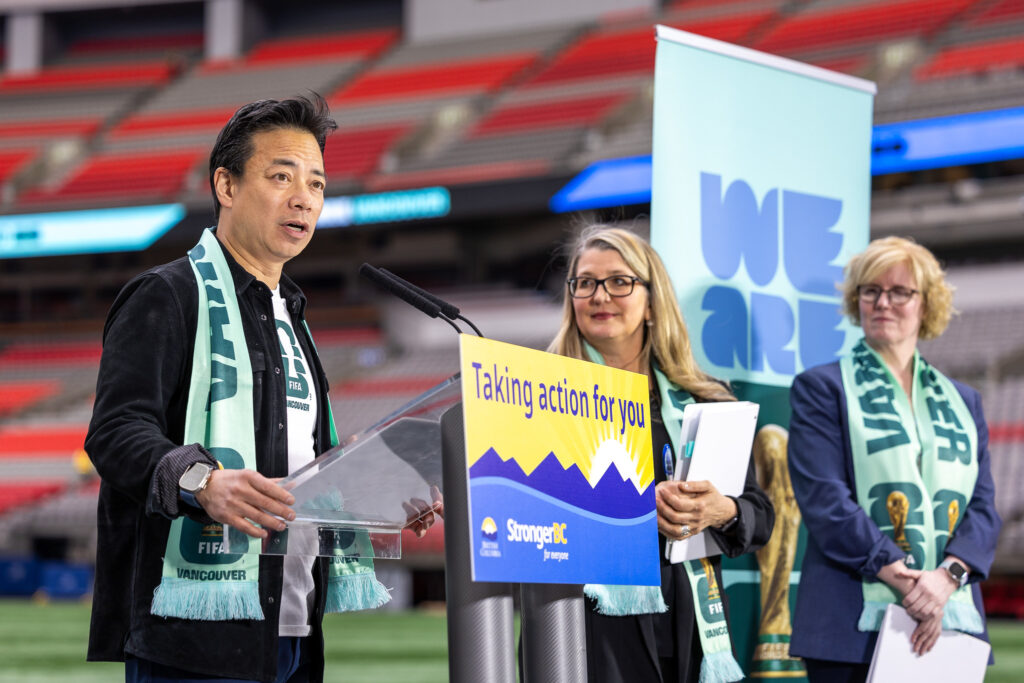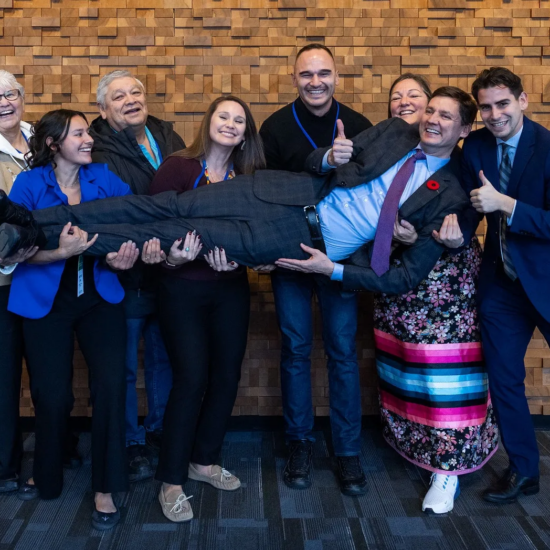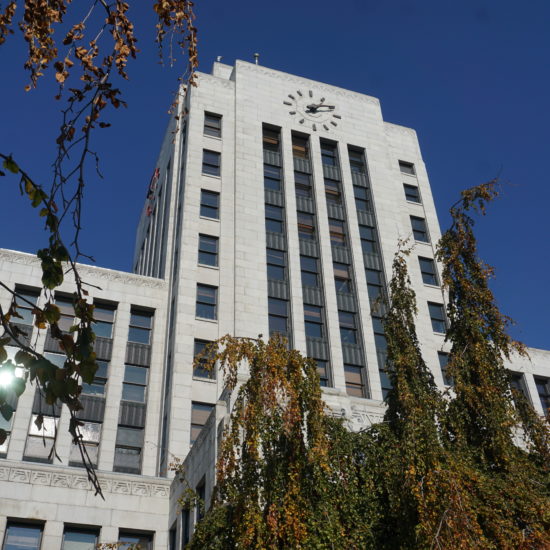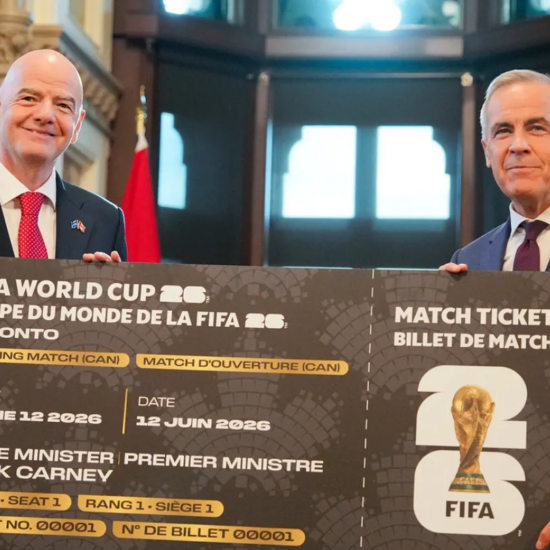
Bob Mackin
More than two years after FIFA named Vancouver’s B.C. Place Stadium one of 16 North American sites of the 2026 World Cup, B.C. Pavilion Corporation (PavCo) has finally revealed the contract that has triggered nearly $600 million in costs for taxpayers.
PavCo, the Crown corporation that operates B.C. Place , had previously released 120, almost totally greyed-out pages after this reporter’s April 2022 freedom of information request.

FIFA’s 2026 World Cup logo (FIFA)
On June 21, in response to this reporter’s appeal to the Office of the Information and Privacy Commissioner, PavCo released a partially censored version of the 96-page stadium agreement and appendices.
The contract was agreed with FIFA’s domestic subsidiary, the Canadian Soccer Association, in advance of 2022’s host city awards. While it contains a confidentiality clause, there is a requirement for both sides to adhere to “relevant laws or court orders.” That would include B.C.’s Freedom of Information and Protection of Privacy Act. Judges and adjudicators have consistently ruled in favour of disclosure of negotiated contracts between public bodies and private entities.
The PavCo version appears substantially the same as FIFA’s stadium agreements previously released by other cities, such as Seattle, Toronto and Santa Clara, Calif. But PavCo is still withholding several key clauses, a letter from PavCo CEO Ken Cretney and a questionnaire.
PavCo, the subsidiary of NDPer Lana Popham’s Ministry of Tourism, Arts, Culture and Sport, claims certain information is protected from disclosure because it constitutes recommendations and advice, and/or potential harm to intergovernmental relations, public body finances and third-party business operations.
Meanwhile, City of Vancouver continues to withhold the host city contract, which is under appeal this summer.
What it says
Vancouver was allotted seven matches between June 13 and July 7, 2026. Two of them will feature the Canadian national team. The stadium agreement gives FIFA full control of what goes on inside and outside B.C. Place from 30 days before the first match to seven days after the last — a two-month period. But infrastructure for food, beverage, hospitality, media, ticketing and technology may show up well before and remain well after that period.
“The stadium authority shall make available, at no costs… all relevant areas and/or facilities at the stadium for any such set-up, installation and preparation work to be done at the stadium as of three months prior to the day of the opening match until two months after the day of completion of the last match staged at the stadium,” the agreement states.
Operational costs and expenses incurred by PavCo “shall be entirely compensated by the payment of the stadium rental fee.” FIFA will not bear the cost of electricity or water, nor will it pay for permanent or temporary equipment, facilities, infrastructure and further engineering systems, such as power supply, elevators, safety systems or access to utilities.
PavCo faces a June 30, 2025 deadline to complete all renovation or construction work. Popham said on April 30 that stadium renovations and tournament operations would cost taxpayers $149 million to $196 million. Works include the installation of a natural grass pitch, upgrades to team dressing rooms and public washrooms, new, larger elevators, a new in-house broadcast facility, improved wifi and a new central video scoreboard.

Vancouver Mayor Ken Sim (left), NDP B.C. sport minister Lana Popham and Liberal sport minister Carla Qualtrough (BC Gov)
The grass playing field must be no less than 125 metres by 85 metres, but FIFA will decide which species of grass will be installed.
There must be two independent sources of power supply and an emergency power system so that “power failure shall not lead to the cancellation or postponement of a match.”
PavCo was required to buy, at its own expense, insurance coverage no later than two years prior to the opening match. FIFA has the power to postpone, relocate, abandon or cancel any World Cup match or the whole tournament. Should any of that happen, BC Place is not entitled to receive any compensation.
B.C. Place must also stage, in conjunction with the CSA, at least three soccer matches in full-stadium format as test events prior to 2026. FIFA has the “non-exclusive right to have free and unrestricted access to visit and inspect the stadium” at no cost, at any time.
Rent stays secret
Detailed seating plans for the seven matches were due by May 31, 2024 “for the entire seating inventory in the stadium, including any permanent and temporary seating, the installation of the VIP tribune, the media tribune or other installations which may affect the seat data.”
PavCo is entitled to “purchase a certain number of tickets for the matches in the stadium (in an amount to be determined by FIFA at a later stage) prior to making such tickets available for sale to the general public.” It cannot use such tickets for commercial purposes, including contest giveaways, without FIFA’s prior written consent.
The agreement contains a clause for the stadium rental fee, but PavCo has withheld the rate sheet it provided to FIFA.
Seattle’s stadium agreement said the basic cost, per match day, at Lumen Field is only US$20,313. But a slew of additional costs for facility management, security, safety, cleaning and waste labour pushed the total over US$1.27 million.
FIFA has the right, under the agreement, to assume and/or appoint a third party to take over PavCo’s obligations, should PavCo “not be fully or partially complying.”
When Vancouver was chosen to be one of the 16 host cities in June 2022, the provincial government estimated taxpayers would be on the hook for $240 million to $260 million.
The cost of hosting has skyrocketed to between $483 million and $581 million — or $69 million to $83 million per match day. Popham blamed inflation and FIFA’s requirements, including the expansion of the 48-nation tournament in Canada, Mexico and U.S. from 80 to 104 matches.
The new, $104 million PNE Amphitheatre, to open in 2026, will be the centrepiece of the FIFA Fan Festival at Hastings Park. It will not be allowed to use the Freedom Mobile name during the World Cup, however, due to FIFA sponsorship rules. Training sites at Killarney, Strathcona, Empire and Jericho parks are to be confirmed.
READ the stadium agreement (obtained by theBreaker.news via FOI) below.
WATCH the explainer video below.
Support theBreaker.news for as low as $2 a month on Patreon. Find out how. Click here.
BCPC – 657 Response Package COPY by Bob Mackin on Scribd











